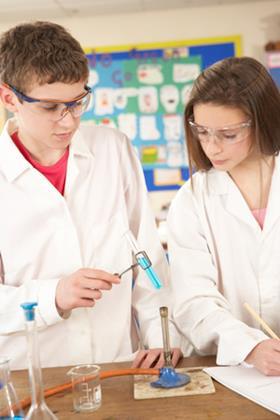Awarding body OCR launches certificate in practical chemistry for level 3 academic and vocational qualifications

From this September the awarding body OCR is planning to offer, subject to approval by the Qualifications and Curriculum Authority (QCA), a level 3 certificate in practical chemistry. The course is aimed at encouraging students to develop a range of practical skills, as well as communication, problem-solving and team work skills in the context of practical work. The course is expected to be a stand alone unit worth one third of an AS specification or one sixth of an A2 specification, and be suitable for academic as well as vocational qualifications. OCR will be seeking recognition of the certificate by UCAS.
Speaking at the ASE national meeting in Reading, Derek Denby, who was part of the team that developed the practical course, said 'Practical work is crucial to learning and understanding chemistry. It not only motivates students and enhances their learning, it provides the best demonstration of "How science works"'. But, he questioned whether the current specifications at A-level provide adequate training in the practical skills so valued by higher education and employers.
Out with the old, in with the new?
According to Denby, the current practical assessment regime at A-level offers a limited number of practicals which on the plus side are reliable, cheap, easy to set up, and deliver results in a short time. But equally, he said, they are formulaic, they test a limited number of skills and thus may not encourage skills development.
The new certificate takes a different approach. The OCR level 3 certificate in practical chemistry will offer a 'practical curriculum' of particular experiments, skills and experiences, which will be assessed via two mandatory components - an externally assessed theory paper and an internally assessed coursework component. It is expected that the theory paper will have structured questions to assess the student's ability to think about their practical work and solve practical problems. For their coursework students will cover a set list of 20 practical techniques and compile a portfolio in either an electronic or hardcopy lab book. This will ensure that students gain confidence in using standard practical skills and equipment. Students, Denby explained, will be assessed not only on their ability to do the experiments but also on their the ability to solve problems in a team and communicate their results to other groups of people.
OCR is currently awaiting approval for its practical course from QCA. If it gets the green light, this could, according to Denby, open the door to similar courses being developed in physics and biology.






No comments yet